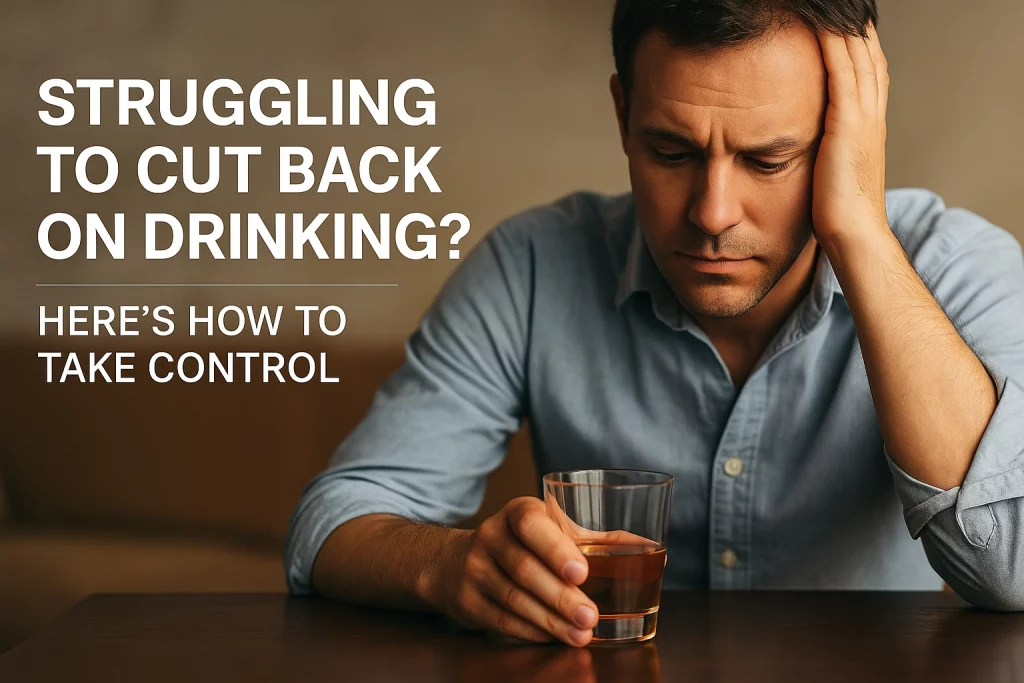If alcohol has started to feel like something you need instead of something you choose, you’re not alone. Many people quietly struggle with alcohol dependency, often while holding down jobs, looking after families, and managing daily life.
This post explains the signs of alcohol dependence, the impact it can have on your body and mind, and how safe, private treatment options like Naltrexone and Nalmefene can help reduce cravings and support recovery.
Table of Contents
What Is Alcohol Dependency?
Alcohol dependency (also called alcohol use disorder) means your body and brain have become used to regular drinking and now rely on it. This doesn’t always mean daily drinking or visible drunkenness. For many, it’s the quiet mental pressure that makes it hard to stop.
You might be dependent if:
- You need a drink to relax, sleep or get through social situations
- One drink often leads to more than planned
- You’ve tried to cut down but keep slipping back
- You feel anxious, low or irritable without it
- Your work, health or relationships are starting to suffer
Alcohol dependency exists on a spectrum. What matters most is recognising when alcohol starts taking more than it gives.
How Alcohol Affects the Brain and Body
Drinking heavily over time changes how the brain works. It reduces your brain’s natural reward system and increases anxiety when alcohol isn’t present. That’s why cravings become harder to manage, even with good intentions.
| Area Affected | Impact |
|---|---|
| Brain chemistry | Creates reliance on alcohol to feel relaxed or happy |
| Liver | Can develop fatty liver, inflammation or long-term damage |
| Sleep | Disrupted sleep patterns, poor quality rest |
| Mood | Linked with depression, anxiety, low motivation |
| Relationships | Withdrawal, tension, or conflict at home or work |
The longer alcohol plays a regular role in life, the more it rewires how your mind and body function.
You Don’t Have to Do It Alone
Support doesn’t always mean going to rehab or stopping suddenly. Many people benefit from private medical treatment designed to reduce alcohol cravings gradually, safely, and without judgment.
Medications like Naltrexone and Nalmefene can make a big difference.
| Medication | How It Works | Who It Helps |
| Naltrexone | Blocks pleasure from alcohol, making it less rewarding | Those wanting to drink less or stop fully |
| Nalmefene | Reduces the urge to drink by balancing brain signals | People who still drink but want better control |
These medications work with your body to change how alcohol feels. Drinking becomes less rewarding and easier to say no to.
You can explore treatment options through our trusted clinical partner here. The process is private, secure, and designed for people who want realistic support.
Signs It Might Be Time for Help
- You think about drinking more than you’d like to
- You avoid social events that don’t include alcohol
- You drink earlier in the day or hide how much you’ve had
- You feel ashamed, tired, or anxious about your habits
- You’ve tried cutting back but keep going back
It’s never too early or too late to reach out. Even if things haven’t spiralled out of control, changing your relationship with alcohol can improve your sleep, energy, mental clarity, and mood.
“You don’t have to hit rock bottom to make a change. You just have to decide you want better.”
Recovery Looks Different for Everyone
Some people want to cut back. Others want to stop completely. Whatever your goal, medication and support can help reduce the fight with cravings and make change feel possible.
You can begin with small steps. Start with a simple online consultation here to check if treatment could work for you.
Private, safe, and confidential because real support meets you where you are.

